Entrepreneurship & Small Business Management: A Detailed Analysis
VerifiedAdded on 2020/10/22
|17
|4878
|239
Report
AI Summary
This report provides a comprehensive analysis of entrepreneurship and small business management, covering various types of entrepreneurial ventures and their typologies, examining the impact of micro and small businesses on the economy, and assessing the importance of small businesses in contributing to the growth of the social economy after Brexit. It also delves into the characteristics, skills, and traits of successful entrepreneurs, exploring how entrepreneurial personality reflects motivation and mindset, and examining how experience and background can foster or hinder entrepreneurship. The report includes detailed comparisons of different entrepreneurial ventures, such as small and social, large and scalable, lifestyle and serial, and female and male entrepreneurship, highlighting their similarities and differences. The goal is to provide a thorough understanding of the entrepreneurial landscape and its economic and social implications.

Entrepreneurship and Small
Business Management
Business Management
Paraphrase This Document
Need a fresh take? Get an instant paraphrase of this document with our AI Paraphraser
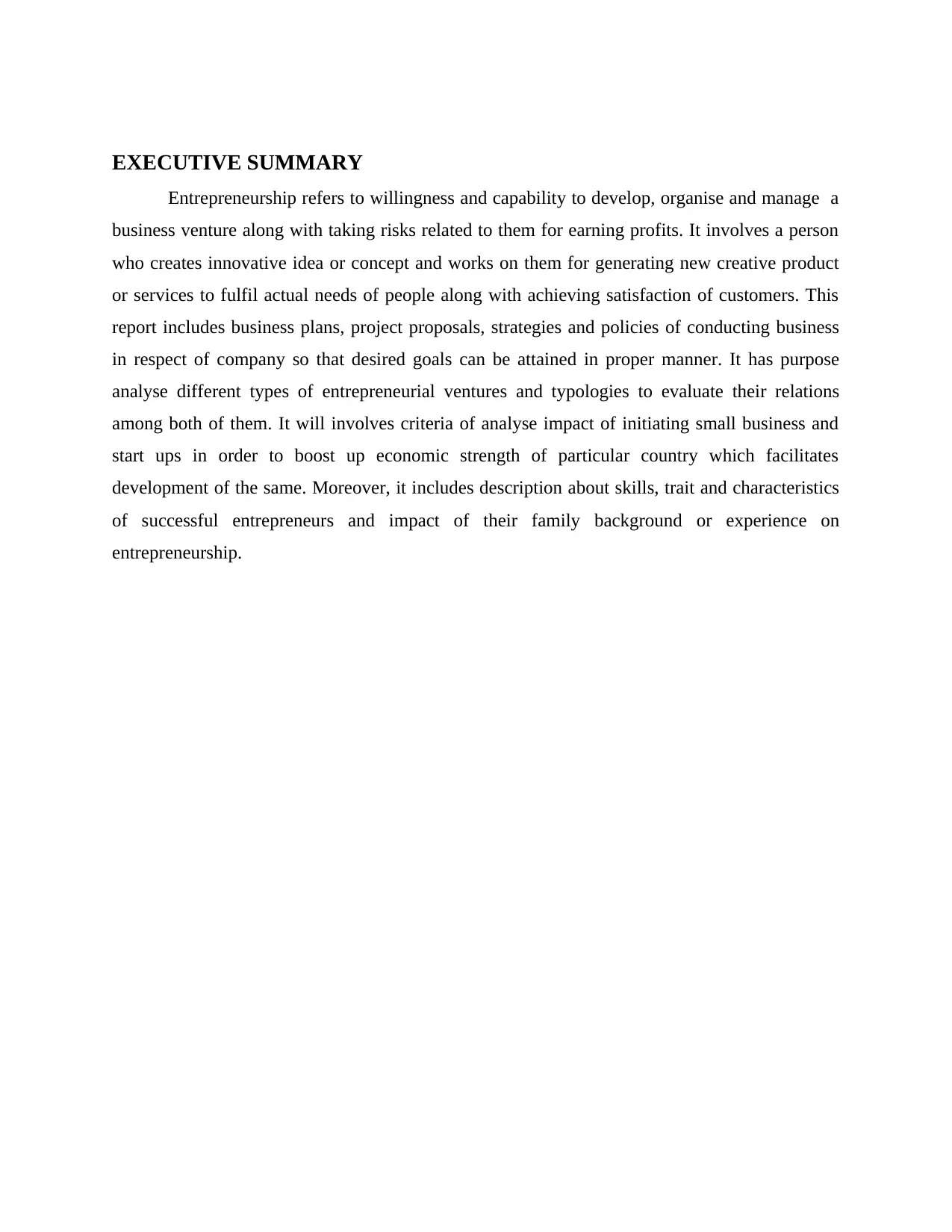
EXECUTIVE SUMMARY
Entrepreneurship refers to willingness and capability to develop, organise and manage a
business venture along with taking risks related to them for earning profits. It involves a person
who creates innovative idea or concept and works on them for generating new creative product
or services to fulfil actual needs of people along with achieving satisfaction of customers. This
report includes business plans, project proposals, strategies and policies of conducting business
in respect of company so that desired goals can be attained in proper manner. It has purpose
analyse different types of entrepreneurial ventures and typologies to evaluate their relations
among both of them. It will involves criteria of analyse impact of initiating small business and
start ups in order to boost up economic strength of particular country which facilitates
development of the same. Moreover, it includes description about skills, trait and characteristics
of successful entrepreneurs and impact of their family background or experience on
entrepreneurship.
Entrepreneurship refers to willingness and capability to develop, organise and manage a
business venture along with taking risks related to them for earning profits. It involves a person
who creates innovative idea or concept and works on them for generating new creative product
or services to fulfil actual needs of people along with achieving satisfaction of customers. This
report includes business plans, project proposals, strategies and policies of conducting business
in respect of company so that desired goals can be attained in proper manner. It has purpose
analyse different types of entrepreneurial ventures and typologies to evaluate their relations
among both of them. It will involves criteria of analyse impact of initiating small business and
start ups in order to boost up economic strength of particular country which facilitates
development of the same. Moreover, it includes description about skills, trait and characteristics
of successful entrepreneurs and impact of their family background or experience on
entrepreneurship.
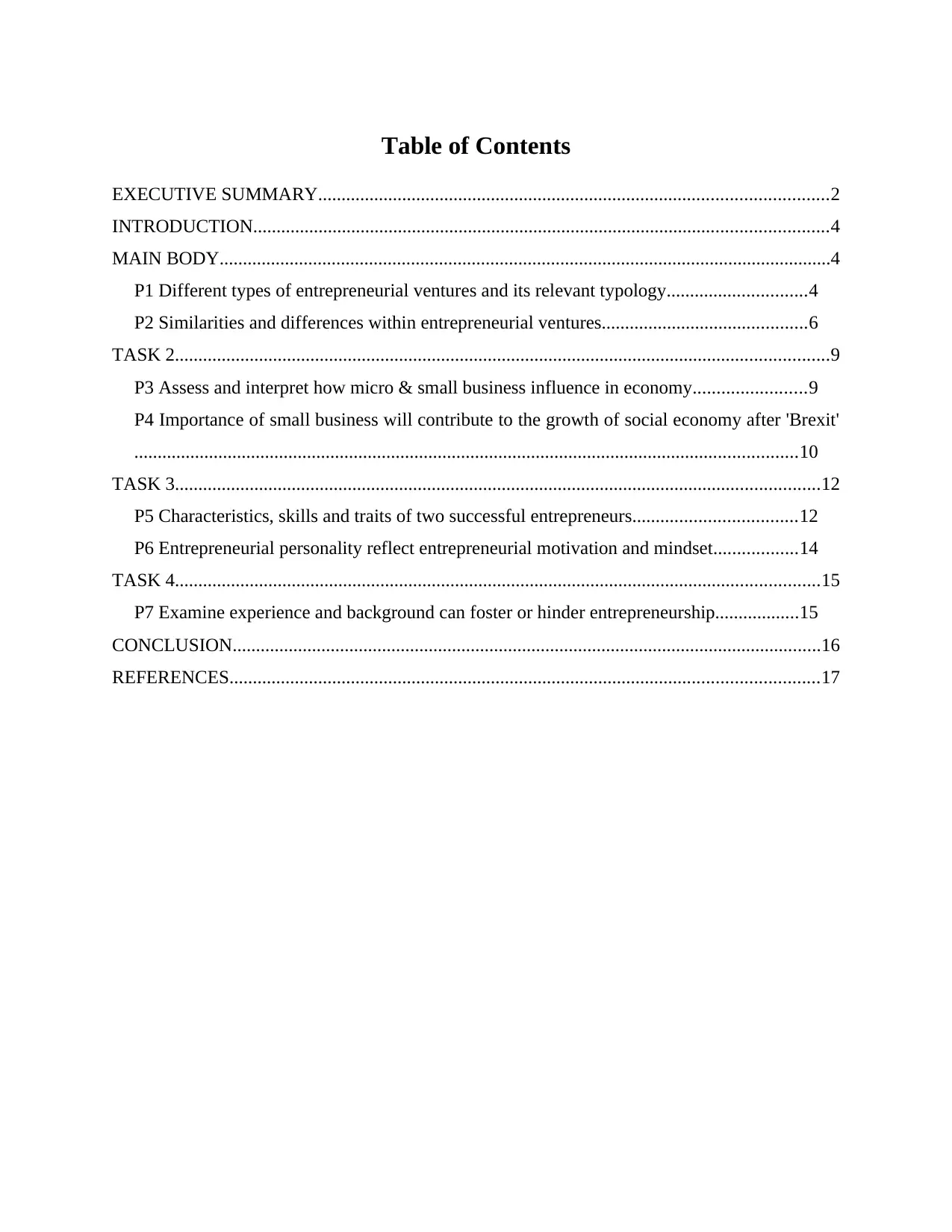
Table of Contents
EXECUTIVE SUMMARY.............................................................................................................2
INTRODUCTION...........................................................................................................................4
MAIN BODY...................................................................................................................................4
P1 Different types of entrepreneurial ventures and its relevant typology..............................4
P2 Similarities and differences within entrepreneurial ventures............................................6
TASK 2............................................................................................................................................9
P3 Assess and interpret how micro & small business influence in economy........................9
P4 Importance of small business will contribute to the growth of social economy after 'Brexit'
..............................................................................................................................................10
TASK 3..........................................................................................................................................12
P5 Characteristics, skills and traits of two successful entrepreneurs...................................12
P6 Entrepreneurial personality reflect entrepreneurial motivation and mindset..................14
TASK 4..........................................................................................................................................15
P7 Examine experience and background can foster or hinder entrepreneurship..................15
CONCLUSION..............................................................................................................................16
REFERENCES..............................................................................................................................17
EXECUTIVE SUMMARY.............................................................................................................2
INTRODUCTION...........................................................................................................................4
MAIN BODY...................................................................................................................................4
P1 Different types of entrepreneurial ventures and its relevant typology..............................4
P2 Similarities and differences within entrepreneurial ventures............................................6
TASK 2............................................................................................................................................9
P3 Assess and interpret how micro & small business influence in economy........................9
P4 Importance of small business will contribute to the growth of social economy after 'Brexit'
..............................................................................................................................................10
TASK 3..........................................................................................................................................12
P5 Characteristics, skills and traits of two successful entrepreneurs...................................12
P6 Entrepreneurial personality reflect entrepreneurial motivation and mindset..................14
TASK 4..........................................................................................................................................15
P7 Examine experience and background can foster or hinder entrepreneurship..................15
CONCLUSION..............................................................................................................................16
REFERENCES..............................................................................................................................17
⊘ This is a preview!⊘
Do you want full access?
Subscribe today to unlock all pages.

Trusted by 1+ million students worldwide
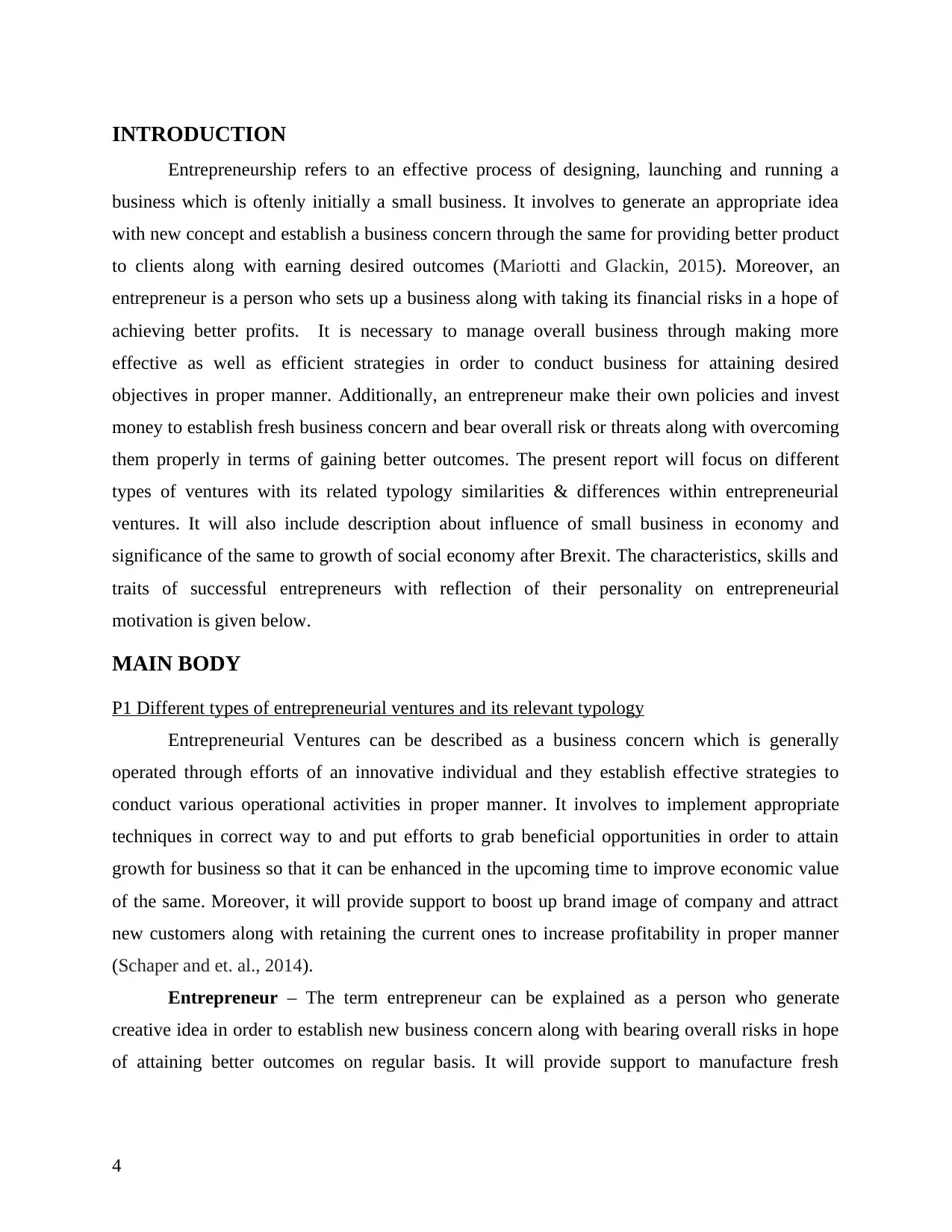
INTRODUCTION
Entrepreneurship refers to an effective process of designing, launching and running a
business which is oftenly initially a small business. It involves to generate an appropriate idea
with new concept and establish a business concern through the same for providing better product
to clients along with earning desired outcomes (Mariotti and Glackin, 2015). Moreover, an
entrepreneur is a person who sets up a business along with taking its financial risks in a hope of
achieving better profits. It is necessary to manage overall business through making more
effective as well as efficient strategies in order to conduct business for attaining desired
objectives in proper manner. Additionally, an entrepreneur make their own policies and invest
money to establish fresh business concern and bear overall risk or threats along with overcoming
them properly in terms of gaining better outcomes. The present report will focus on different
types of ventures with its related typology similarities & differences within entrepreneurial
ventures. It will also include description about influence of small business in economy and
significance of the same to growth of social economy after Brexit. The characteristics, skills and
traits of successful entrepreneurs with reflection of their personality on entrepreneurial
motivation is given below.
MAIN BODY
P1 Different types of entrepreneurial ventures and its relevant typology
Entrepreneurial Ventures can be described as a business concern which is generally
operated through efforts of an innovative individual and they establish effective strategies to
conduct various operational activities in proper manner. It involves to implement appropriate
techniques in correct way to and put efforts to grab beneficial opportunities in order to attain
growth for business so that it can be enhanced in the upcoming time to improve economic value
of the same. Moreover, it will provide support to boost up brand image of company and attract
new customers along with retaining the current ones to increase profitability in proper manner
(Schaper and et. al., 2014).
Entrepreneur – The term entrepreneur can be explained as a person who generate
creative idea in order to establish new business concern along with bearing overall risks in hope
of attaining better outcomes on regular basis. It will provide support to manufacture fresh
4
Entrepreneurship refers to an effective process of designing, launching and running a
business which is oftenly initially a small business. It involves to generate an appropriate idea
with new concept and establish a business concern through the same for providing better product
to clients along with earning desired outcomes (Mariotti and Glackin, 2015). Moreover, an
entrepreneur is a person who sets up a business along with taking its financial risks in a hope of
achieving better profits. It is necessary to manage overall business through making more
effective as well as efficient strategies in order to conduct business for attaining desired
objectives in proper manner. Additionally, an entrepreneur make their own policies and invest
money to establish fresh business concern and bear overall risk or threats along with overcoming
them properly in terms of gaining better outcomes. The present report will focus on different
types of ventures with its related typology similarities & differences within entrepreneurial
ventures. It will also include description about influence of small business in economy and
significance of the same to growth of social economy after Brexit. The characteristics, skills and
traits of successful entrepreneurs with reflection of their personality on entrepreneurial
motivation is given below.
MAIN BODY
P1 Different types of entrepreneurial ventures and its relevant typology
Entrepreneurial Ventures can be described as a business concern which is generally
operated through efforts of an innovative individual and they establish effective strategies to
conduct various operational activities in proper manner. It involves to implement appropriate
techniques in correct way to and put efforts to grab beneficial opportunities in order to attain
growth for business so that it can be enhanced in the upcoming time to improve economic value
of the same. Moreover, it will provide support to boost up brand image of company and attract
new customers along with retaining the current ones to increase profitability in proper manner
(Schaper and et. al., 2014).
Entrepreneur – The term entrepreneur can be explained as a person who generate
creative idea in order to establish new business concern along with bearing overall risks in hope
of attaining better outcomes on regular basis. It will provide support to manufacture fresh
4
Paraphrase This Document
Need a fresh take? Get an instant paraphrase of this document with our AI Paraphraser
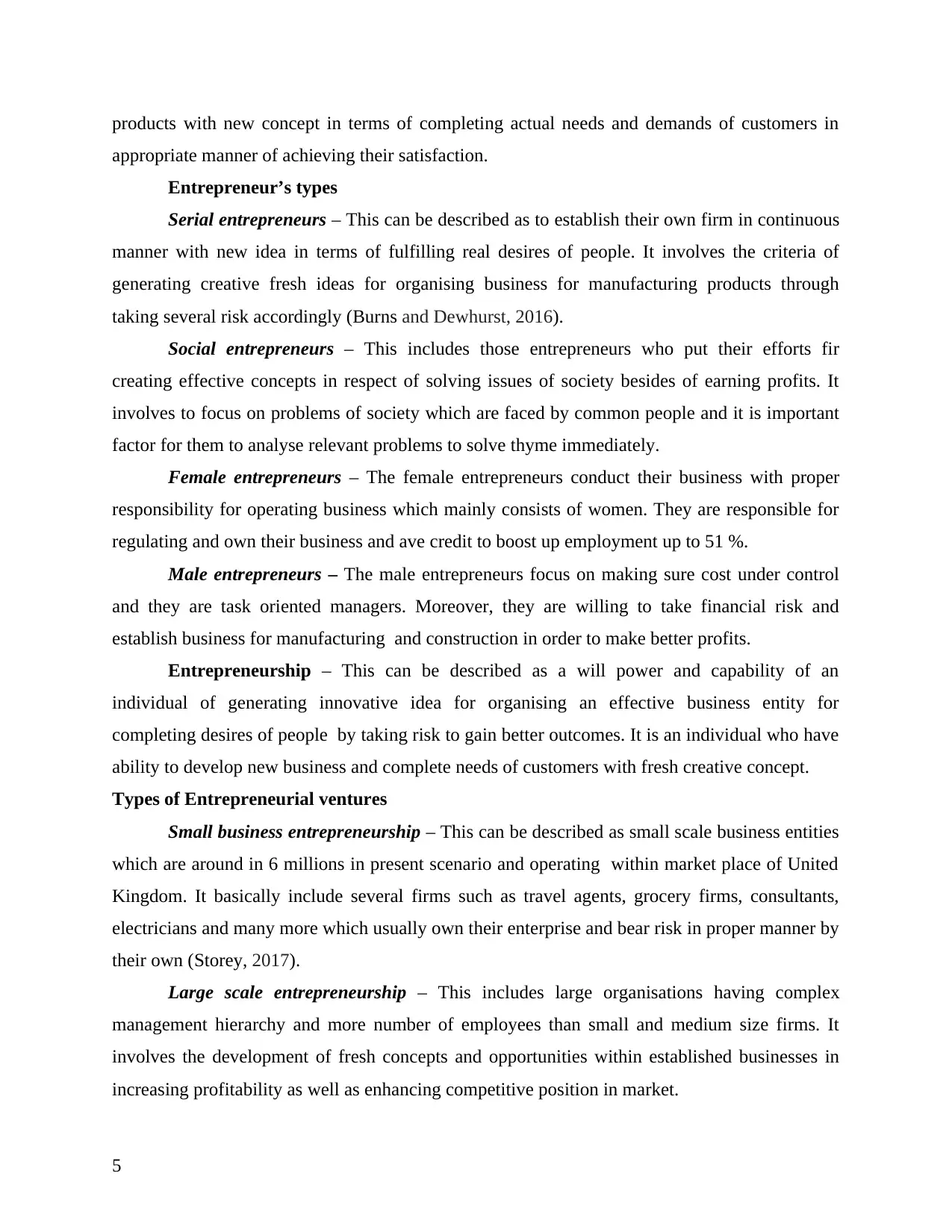
products with new concept in terms of completing actual needs and demands of customers in
appropriate manner of achieving their satisfaction.
Entrepreneur’s types
Serial entrepreneurs – This can be described as to establish their own firm in continuous
manner with new idea in terms of fulfilling real desires of people. It involves the criteria of
generating creative fresh ideas for organising business for manufacturing products through
taking several risk accordingly (Burns and Dewhurst, 2016).
Social entrepreneurs – This includes those entrepreneurs who put their efforts fir
creating effective concepts in respect of solving issues of society besides of earning profits. It
involves to focus on problems of society which are faced by common people and it is important
factor for them to analyse relevant problems to solve thyme immediately.
Female entrepreneurs – The female entrepreneurs conduct their business with proper
responsibility for operating business which mainly consists of women. They are responsible for
regulating and own their business and ave credit to boost up employment up to 51 %.
Male entrepreneurs – The male entrepreneurs focus on making sure cost under control
and they are task oriented managers. Moreover, they are willing to take financial risk and
establish business for manufacturing and construction in order to make better profits.
Entrepreneurship – This can be described as a will power and capability of an
individual of generating innovative idea for organising an effective business entity for
completing desires of people by taking risk to gain better outcomes. It is an individual who have
ability to develop new business and complete needs of customers with fresh creative concept.
Types of Entrepreneurial ventures
Small business entrepreneurship – This can be described as small scale business entities
which are around in 6 millions in present scenario and operating within market place of United
Kingdom. It basically include several firms such as travel agents, grocery firms, consultants,
electricians and many more which usually own their enterprise and bear risk in proper manner by
their own (Storey, 2017).
Large scale entrepreneurship – This includes large organisations having complex
management hierarchy and more number of employees than small and medium size firms. It
involves the development of fresh concepts and opportunities within established businesses in
increasing profitability as well as enhancing competitive position in market.
5
appropriate manner of achieving their satisfaction.
Entrepreneur’s types
Serial entrepreneurs – This can be described as to establish their own firm in continuous
manner with new idea in terms of fulfilling real desires of people. It involves the criteria of
generating creative fresh ideas for organising business for manufacturing products through
taking several risk accordingly (Burns and Dewhurst, 2016).
Social entrepreneurs – This includes those entrepreneurs who put their efforts fir
creating effective concepts in respect of solving issues of society besides of earning profits. It
involves to focus on problems of society which are faced by common people and it is important
factor for them to analyse relevant problems to solve thyme immediately.
Female entrepreneurs – The female entrepreneurs conduct their business with proper
responsibility for operating business which mainly consists of women. They are responsible for
regulating and own their business and ave credit to boost up employment up to 51 %.
Male entrepreneurs – The male entrepreneurs focus on making sure cost under control
and they are task oriented managers. Moreover, they are willing to take financial risk and
establish business for manufacturing and construction in order to make better profits.
Entrepreneurship – This can be described as a will power and capability of an
individual of generating innovative idea for organising an effective business entity for
completing desires of people by taking risk to gain better outcomes. It is an individual who have
ability to develop new business and complete needs of customers with fresh creative concept.
Types of Entrepreneurial ventures
Small business entrepreneurship – This can be described as small scale business entities
which are around in 6 millions in present scenario and operating within market place of United
Kingdom. It basically include several firms such as travel agents, grocery firms, consultants,
electricians and many more which usually own their enterprise and bear risk in proper manner by
their own (Storey, 2017).
Large scale entrepreneurship – This includes large organisations having complex
management hierarchy and more number of employees than small and medium size firms. It
involves the development of fresh concepts and opportunities within established businesses in
increasing profitability as well as enhancing competitive position in market.
5
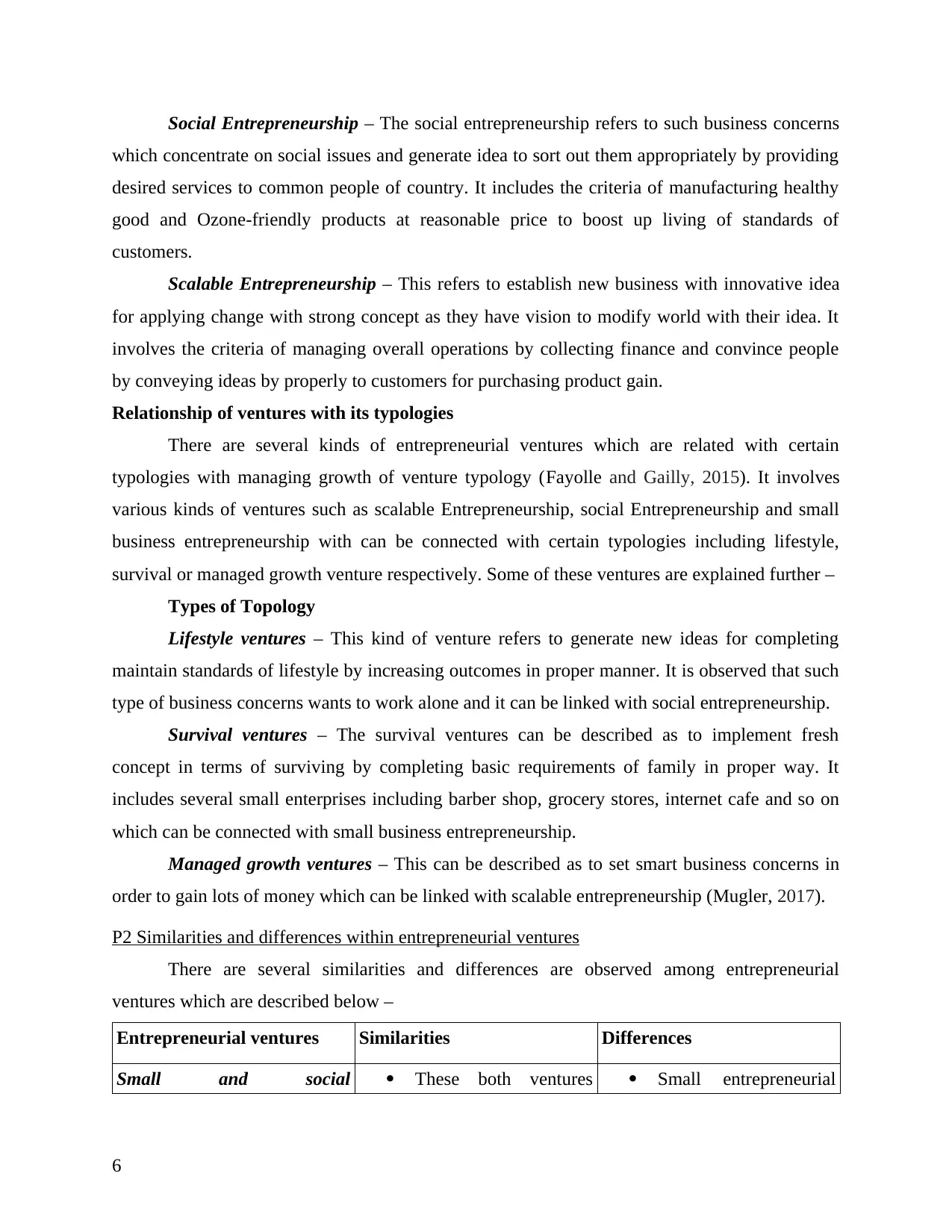
Social Entrepreneurship – The social entrepreneurship refers to such business concerns
which concentrate on social issues and generate idea to sort out them appropriately by providing
desired services to common people of country. It includes the criteria of manufacturing healthy
good and Ozone-friendly products at reasonable price to boost up living of standards of
customers.
Scalable Entrepreneurship – This refers to establish new business with innovative idea
for applying change with strong concept as they have vision to modify world with their idea. It
involves the criteria of managing overall operations by collecting finance and convince people
by conveying ideas by properly to customers for purchasing product gain.
Relationship of ventures with its typologies
There are several kinds of entrepreneurial ventures which are related with certain
typologies with managing growth of venture typology (Fayolle and Gailly, 2015). It involves
various kinds of ventures such as scalable Entrepreneurship, social Entrepreneurship and small
business entrepreneurship with can be connected with certain typologies including lifestyle,
survival or managed growth venture respectively. Some of these ventures are explained further –
Types of Topology
Lifestyle ventures – This kind of venture refers to generate new ideas for completing
maintain standards of lifestyle by increasing outcomes in proper manner. It is observed that such
type of business concerns wants to work alone and it can be linked with social entrepreneurship.
Survival ventures – The survival ventures can be described as to implement fresh
concept in terms of surviving by completing basic requirements of family in proper way. It
includes several small enterprises including barber shop, grocery stores, internet cafe and so on
which can be connected with small business entrepreneurship.
Managed growth ventures – This can be described as to set smart business concerns in
order to gain lots of money which can be linked with scalable entrepreneurship (Mugler, 2017).
P2 Similarities and differences within entrepreneurial ventures
There are several similarities and differences are observed among entrepreneurial
ventures which are described below –
Entrepreneurial ventures Similarities Differences
Small and social These both ventures Small entrepreneurial
6
which concentrate on social issues and generate idea to sort out them appropriately by providing
desired services to common people of country. It includes the criteria of manufacturing healthy
good and Ozone-friendly products at reasonable price to boost up living of standards of
customers.
Scalable Entrepreneurship – This refers to establish new business with innovative idea
for applying change with strong concept as they have vision to modify world with their idea. It
involves the criteria of managing overall operations by collecting finance and convince people
by conveying ideas by properly to customers for purchasing product gain.
Relationship of ventures with its typologies
There are several kinds of entrepreneurial ventures which are related with certain
typologies with managing growth of venture typology (Fayolle and Gailly, 2015). It involves
various kinds of ventures such as scalable Entrepreneurship, social Entrepreneurship and small
business entrepreneurship with can be connected with certain typologies including lifestyle,
survival or managed growth venture respectively. Some of these ventures are explained further –
Types of Topology
Lifestyle ventures – This kind of venture refers to generate new ideas for completing
maintain standards of lifestyle by increasing outcomes in proper manner. It is observed that such
type of business concerns wants to work alone and it can be linked with social entrepreneurship.
Survival ventures – The survival ventures can be described as to implement fresh
concept in terms of surviving by completing basic requirements of family in proper way. It
includes several small enterprises including barber shop, grocery stores, internet cafe and so on
which can be connected with small business entrepreneurship.
Managed growth ventures – This can be described as to set smart business concerns in
order to gain lots of money which can be linked with scalable entrepreneurship (Mugler, 2017).
P2 Similarities and differences within entrepreneurial ventures
There are several similarities and differences are observed among entrepreneurial
ventures which are described below –
Entrepreneurial ventures Similarities Differences
Small and social These both ventures Small entrepreneurial
6
⊘ This is a preview!⊘
Do you want full access?
Subscribe today to unlock all pages.

Trusted by 1+ million students worldwide
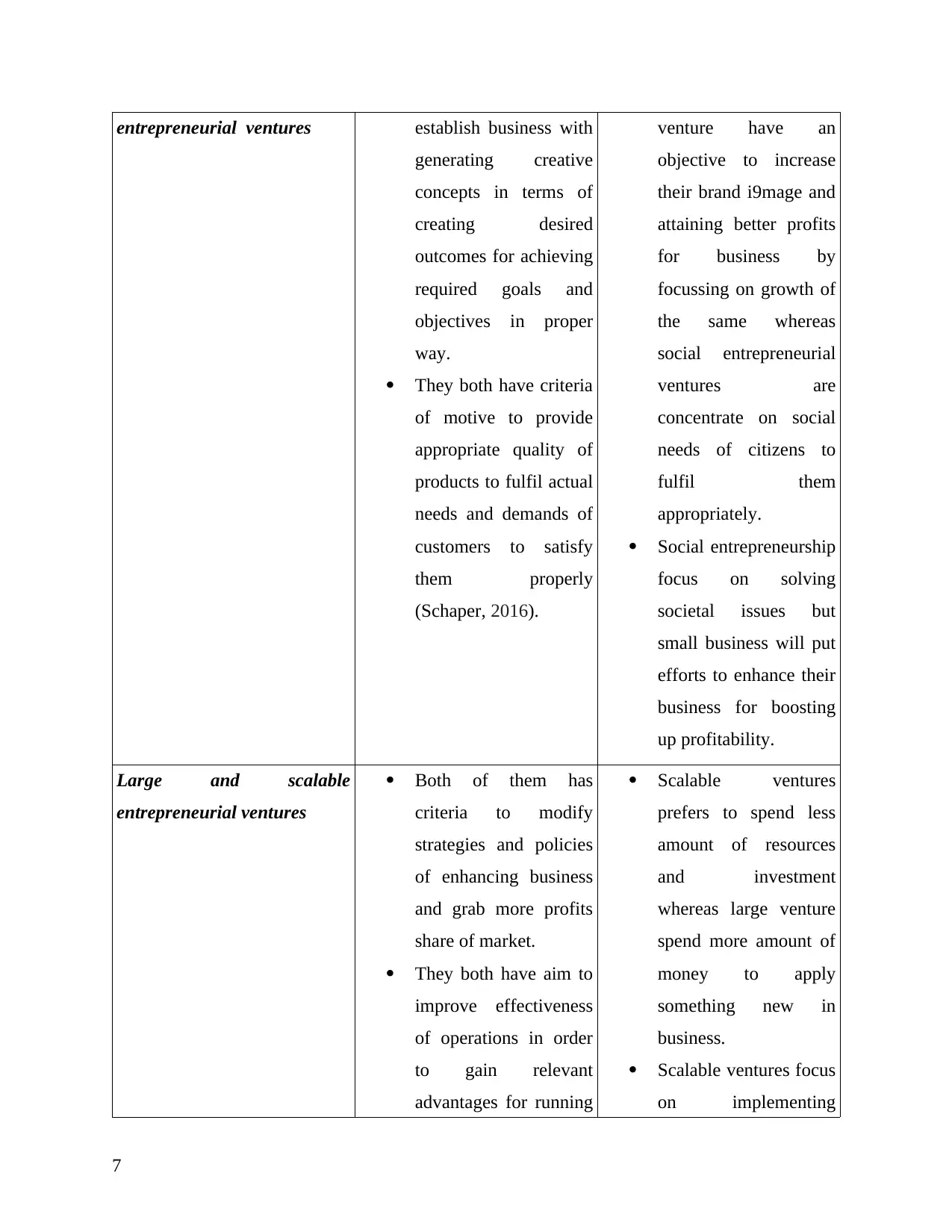
entrepreneurial ventures establish business with
generating creative
concepts in terms of
creating desired
outcomes for achieving
required goals and
objectives in proper
way.
They both have criteria
of motive to provide
appropriate quality of
products to fulfil actual
needs and demands of
customers to satisfy
them properly
(Schaper, 2016).
venture have an
objective to increase
their brand i9mage and
attaining better profits
for business by
focussing on growth of
the same whereas
social entrepreneurial
ventures are
concentrate on social
needs of citizens to
fulfil them
appropriately.
Social entrepreneurship
focus on solving
societal issues but
small business will put
efforts to enhance their
business for boosting
up profitability.
Large and scalable
entrepreneurial ventures
Both of them has
criteria to modify
strategies and policies
of enhancing business
and grab more profits
share of market.
They both have aim to
improve effectiveness
of operations in order
to gain relevant
advantages for running
Scalable ventures
prefers to spend less
amount of resources
and investment
whereas large venture
spend more amount of
money to apply
something new in
business.
Scalable ventures focus
on implementing
7
generating creative
concepts in terms of
creating desired
outcomes for achieving
required goals and
objectives in proper
way.
They both have criteria
of motive to provide
appropriate quality of
products to fulfil actual
needs and demands of
customers to satisfy
them properly
(Schaper, 2016).
venture have an
objective to increase
their brand i9mage and
attaining better profits
for business by
focussing on growth of
the same whereas
social entrepreneurial
ventures are
concentrate on social
needs of citizens to
fulfil them
appropriately.
Social entrepreneurship
focus on solving
societal issues but
small business will put
efforts to enhance their
business for boosting
up profitability.
Large and scalable
entrepreneurial ventures
Both of them has
criteria to modify
strategies and policies
of enhancing business
and grab more profits
share of market.
They both have aim to
improve effectiveness
of operations in order
to gain relevant
advantages for running
Scalable ventures
prefers to spend less
amount of resources
and investment
whereas large venture
spend more amount of
money to apply
something new in
business.
Scalable ventures focus
on implementing
7
Paraphrase This Document
Need a fresh take? Get an instant paraphrase of this document with our AI Paraphraser
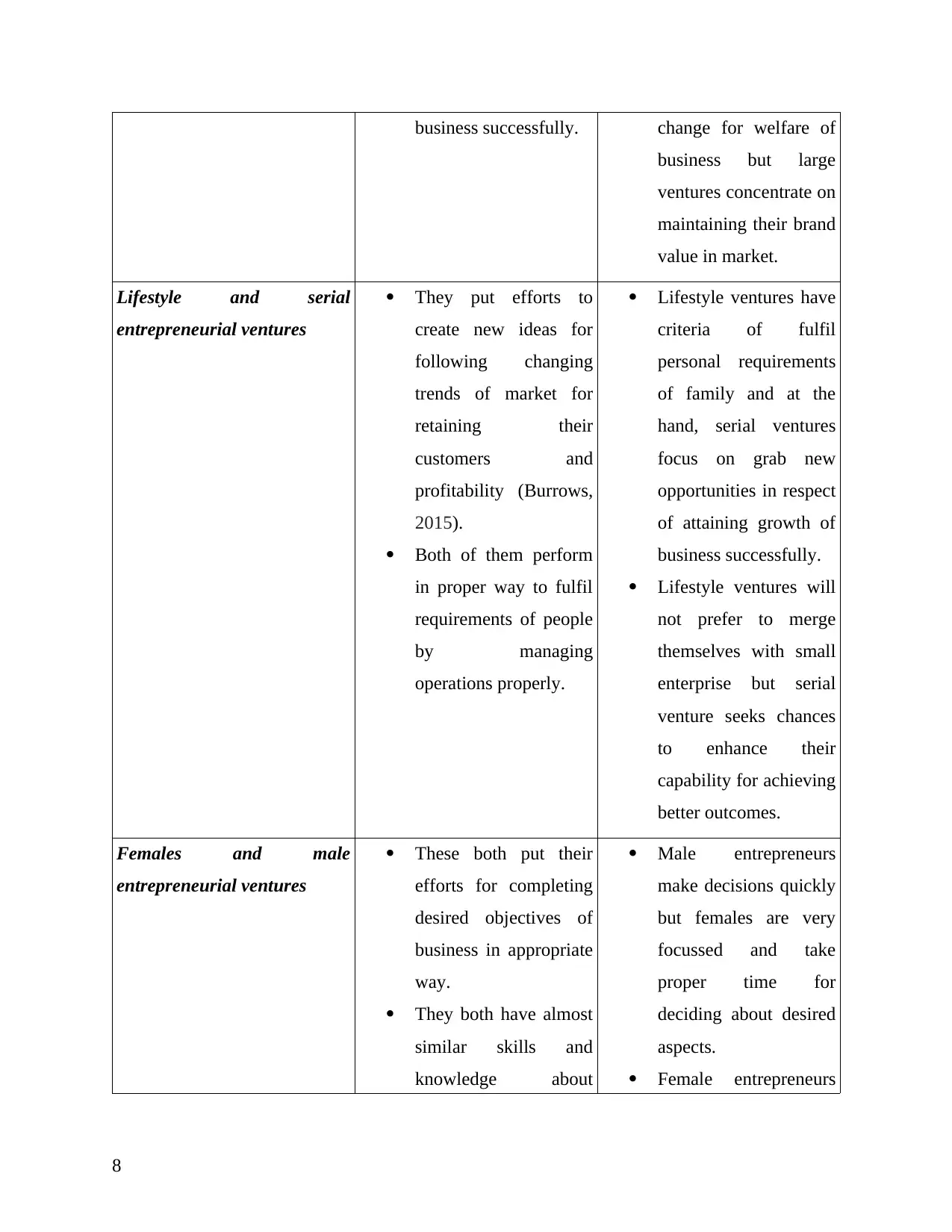
business successfully. change for welfare of
business but large
ventures concentrate on
maintaining their brand
value in market.
Lifestyle and serial
entrepreneurial ventures
They put efforts to
create new ideas for
following changing
trends of market for
retaining their
customers and
profitability (Burrows,
2015).
Both of them perform
in proper way to fulfil
requirements of people
by managing
operations properly.
Lifestyle ventures have
criteria of fulfil
personal requirements
of family and at the
hand, serial ventures
focus on grab new
opportunities in respect
of attaining growth of
business successfully.
Lifestyle ventures will
not prefer to merge
themselves with small
enterprise but serial
venture seeks chances
to enhance their
capability for achieving
better outcomes.
Females and male
entrepreneurial ventures
These both put their
efforts for completing
desired objectives of
business in appropriate
way.
They both have almost
similar skills and
knowledge about
Male entrepreneurs
make decisions quickly
but females are very
focussed and take
proper time for
deciding about desired
aspects.
Female entrepreneurs
8
business but large
ventures concentrate on
maintaining their brand
value in market.
Lifestyle and serial
entrepreneurial ventures
They put efforts to
create new ideas for
following changing
trends of market for
retaining their
customers and
profitability (Burrows,
2015).
Both of them perform
in proper way to fulfil
requirements of people
by managing
operations properly.
Lifestyle ventures have
criteria of fulfil
personal requirements
of family and at the
hand, serial ventures
focus on grab new
opportunities in respect
of attaining growth of
business successfully.
Lifestyle ventures will
not prefer to merge
themselves with small
enterprise but serial
venture seeks chances
to enhance their
capability for achieving
better outcomes.
Females and male
entrepreneurial ventures
These both put their
efforts for completing
desired objectives of
business in appropriate
way.
They both have almost
similar skills and
knowledge about
Male entrepreneurs
make decisions quickly
but females are very
focussed and take
proper time for
deciding about desired
aspects.
Female entrepreneurs
8
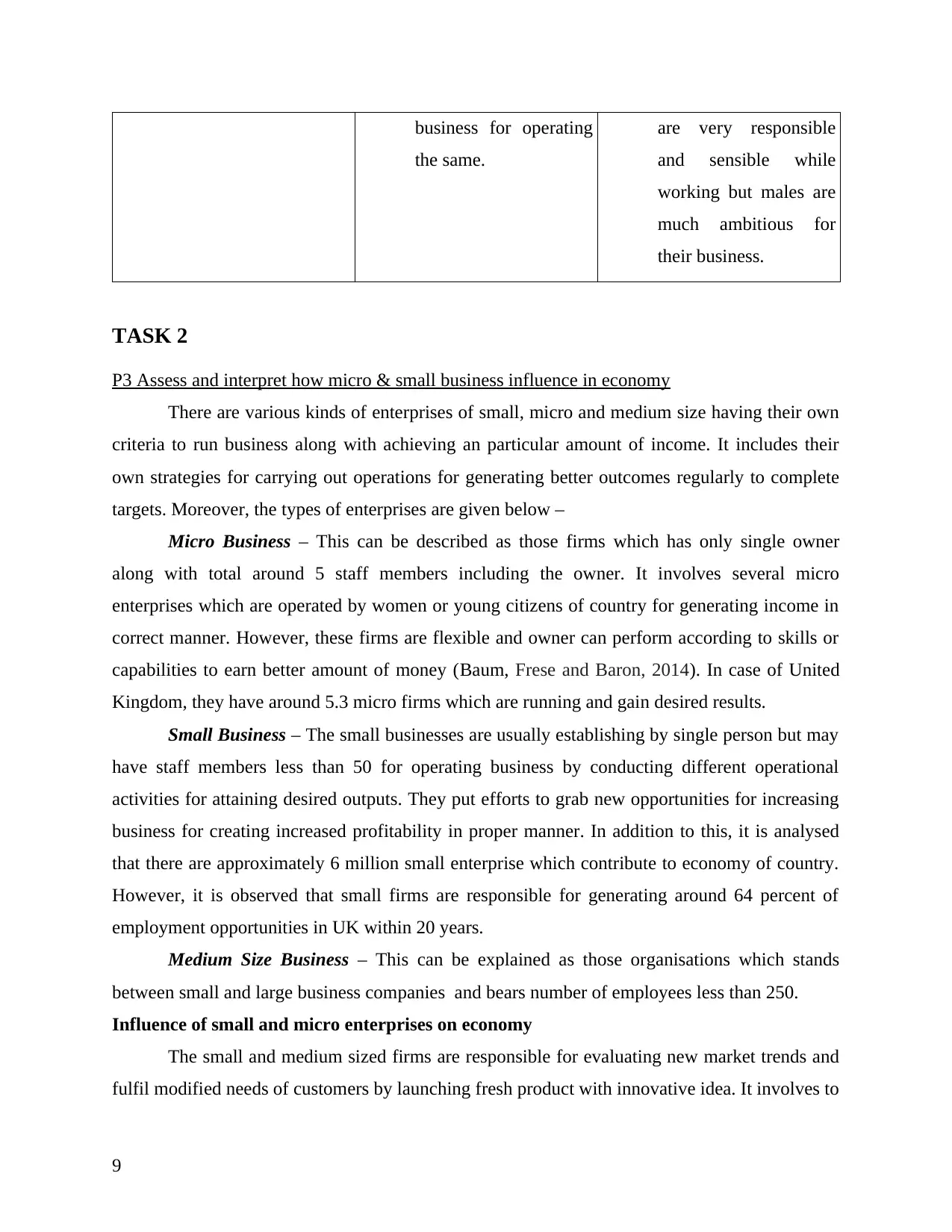
business for operating
the same.
are very responsible
and sensible while
working but males are
much ambitious for
their business.
TASK 2
P3 Assess and interpret how micro & small business influence in economy
There are various kinds of enterprises of small, micro and medium size having their own
criteria to run business along with achieving an particular amount of income. It includes their
own strategies for carrying out operations for generating better outcomes regularly to complete
targets. Moreover, the types of enterprises are given below –
Micro Business – This can be described as those firms which has only single owner
along with total around 5 staff members including the owner. It involves several micro
enterprises which are operated by women or young citizens of country for generating income in
correct manner. However, these firms are flexible and owner can perform according to skills or
capabilities to earn better amount of money (Baum, Frese and Baron, 2014). In case of United
Kingdom, they have around 5.3 micro firms which are running and gain desired results.
Small Business – The small businesses are usually establishing by single person but may
have staff members less than 50 for operating business by conducting different operational
activities for attaining desired outputs. They put efforts to grab new opportunities for increasing
business for creating increased profitability in proper manner. In addition to this, it is analysed
that there are approximately 6 million small enterprise which contribute to economy of country.
However, it is observed that small firms are responsible for generating around 64 percent of
employment opportunities in UK within 20 years.
Medium Size Business – This can be explained as those organisations which stands
between small and large business companies and bears number of employees less than 250.
Influence of small and micro enterprises on economy
The small and medium sized firms are responsible for evaluating new market trends and
fulfil modified needs of customers by launching fresh product with innovative idea. It involves to
9
the same.
are very responsible
and sensible while
working but males are
much ambitious for
their business.
TASK 2
P3 Assess and interpret how micro & small business influence in economy
There are various kinds of enterprises of small, micro and medium size having their own
criteria to run business along with achieving an particular amount of income. It includes their
own strategies for carrying out operations for generating better outcomes regularly to complete
targets. Moreover, the types of enterprises are given below –
Micro Business – This can be described as those firms which has only single owner
along with total around 5 staff members including the owner. It involves several micro
enterprises which are operated by women or young citizens of country for generating income in
correct manner. However, these firms are flexible and owner can perform according to skills or
capabilities to earn better amount of money (Baum, Frese and Baron, 2014). In case of United
Kingdom, they have around 5.3 micro firms which are running and gain desired results.
Small Business – The small businesses are usually establishing by single person but may
have staff members less than 50 for operating business by conducting different operational
activities for attaining desired outputs. They put efforts to grab new opportunities for increasing
business for creating increased profitability in proper manner. In addition to this, it is analysed
that there are approximately 6 million small enterprise which contribute to economy of country.
However, it is observed that small firms are responsible for generating around 64 percent of
employment opportunities in UK within 20 years.
Medium Size Business – This can be explained as those organisations which stands
between small and large business companies and bears number of employees less than 250.
Influence of small and micro enterprises on economy
The small and medium sized firms are responsible for evaluating new market trends and
fulfil modified needs of customers by launching fresh product with innovative idea. It involves to
9
⊘ This is a preview!⊘
Do you want full access?
Subscribe today to unlock all pages.

Trusted by 1+ million students worldwide
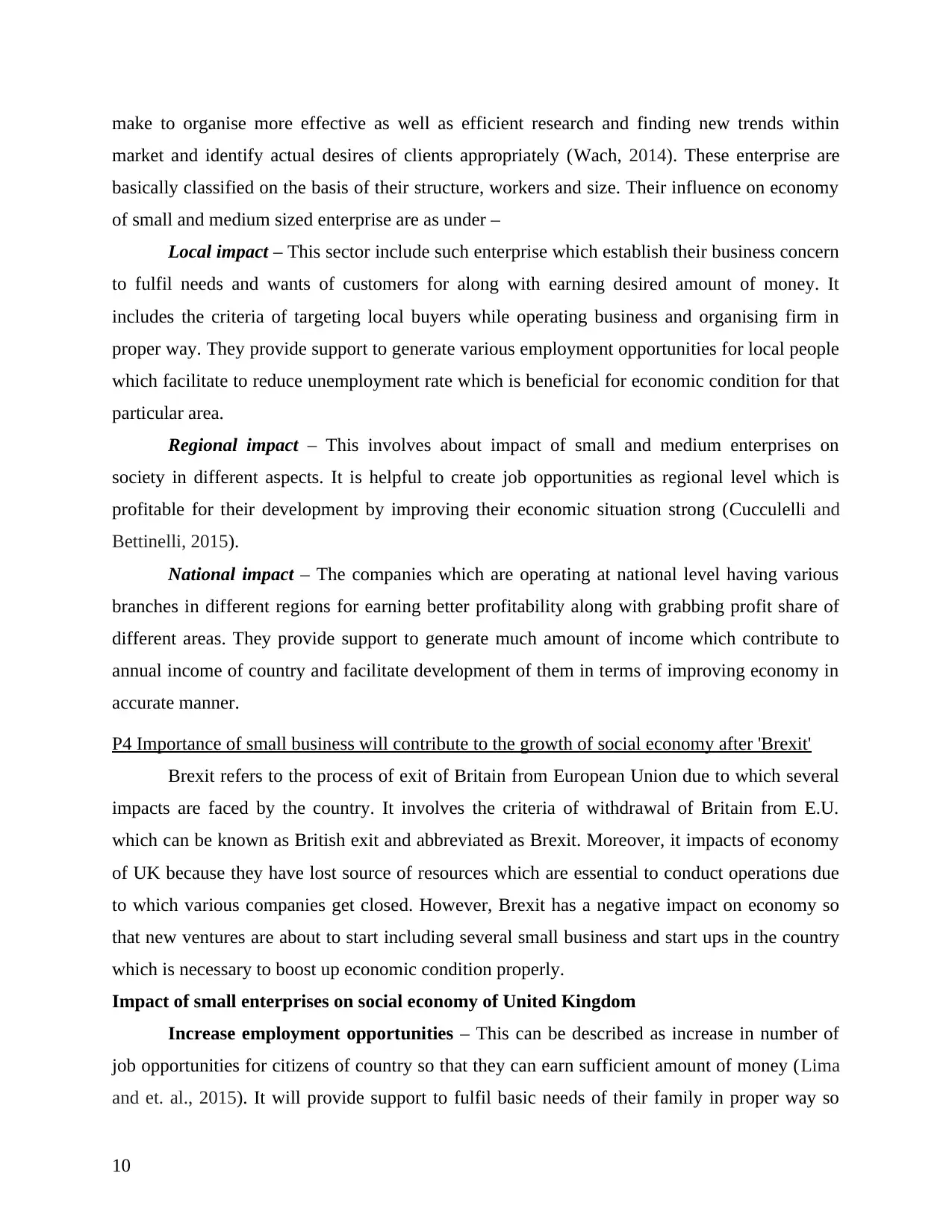
make to organise more effective as well as efficient research and finding new trends within
market and identify actual desires of clients appropriately (Wach, 2014). These enterprise are
basically classified on the basis of their structure, workers and size. Their influence on economy
of small and medium sized enterprise are as under –
Local impact – This sector include such enterprise which establish their business concern
to fulfil needs and wants of customers for along with earning desired amount of money. It
includes the criteria of targeting local buyers while operating business and organising firm in
proper way. They provide support to generate various employment opportunities for local people
which facilitate to reduce unemployment rate which is beneficial for economic condition for that
particular area.
Regional impact – This involves about impact of small and medium enterprises on
society in different aspects. It is helpful to create job opportunities as regional level which is
profitable for their development by improving their economic situation strong (Cucculelli and
Bettinelli, 2015).
National impact – The companies which are operating at national level having various
branches in different regions for earning better profitability along with grabbing profit share of
different areas. They provide support to generate much amount of income which contribute to
annual income of country and facilitate development of them in terms of improving economy in
accurate manner.
P4 Importance of small business will contribute to the growth of social economy after 'Brexit'
Brexit refers to the process of exit of Britain from European Union due to which several
impacts are faced by the country. It involves the criteria of withdrawal of Britain from E.U.
which can be known as British exit and abbreviated as Brexit. Moreover, it impacts of economy
of UK because they have lost source of resources which are essential to conduct operations due
to which various companies get closed. However, Brexit has a negative impact on economy so
that new ventures are about to start including several small business and start ups in the country
which is necessary to boost up economic condition properly.
Impact of small enterprises on social economy of United Kingdom
Increase employment opportunities – This can be described as increase in number of
job opportunities for citizens of country so that they can earn sufficient amount of money (Lima
and et. al., 2015). It will provide support to fulfil basic needs of their family in proper way so
10
market and identify actual desires of clients appropriately (Wach, 2014). These enterprise are
basically classified on the basis of their structure, workers and size. Their influence on economy
of small and medium sized enterprise are as under –
Local impact – This sector include such enterprise which establish their business concern
to fulfil needs and wants of customers for along with earning desired amount of money. It
includes the criteria of targeting local buyers while operating business and organising firm in
proper way. They provide support to generate various employment opportunities for local people
which facilitate to reduce unemployment rate which is beneficial for economic condition for that
particular area.
Regional impact – This involves about impact of small and medium enterprises on
society in different aspects. It is helpful to create job opportunities as regional level which is
profitable for their development by improving their economic situation strong (Cucculelli and
Bettinelli, 2015).
National impact – The companies which are operating at national level having various
branches in different regions for earning better profitability along with grabbing profit share of
different areas. They provide support to generate much amount of income which contribute to
annual income of country and facilitate development of them in terms of improving economy in
accurate manner.
P4 Importance of small business will contribute to the growth of social economy after 'Brexit'
Brexit refers to the process of exit of Britain from European Union due to which several
impacts are faced by the country. It involves the criteria of withdrawal of Britain from E.U.
which can be known as British exit and abbreviated as Brexit. Moreover, it impacts of economy
of UK because they have lost source of resources which are essential to conduct operations due
to which various companies get closed. However, Brexit has a negative impact on economy so
that new ventures are about to start including several small business and start ups in the country
which is necessary to boost up economic condition properly.
Impact of small enterprises on social economy of United Kingdom
Increase employment opportunities – This can be described as increase in number of
job opportunities for citizens of country so that they can earn sufficient amount of money (Lima
and et. al., 2015). It will provide support to fulfil basic needs of their family in proper way so
10
Paraphrase This Document
Need a fresh take? Get an instant paraphrase of this document with our AI Paraphraser
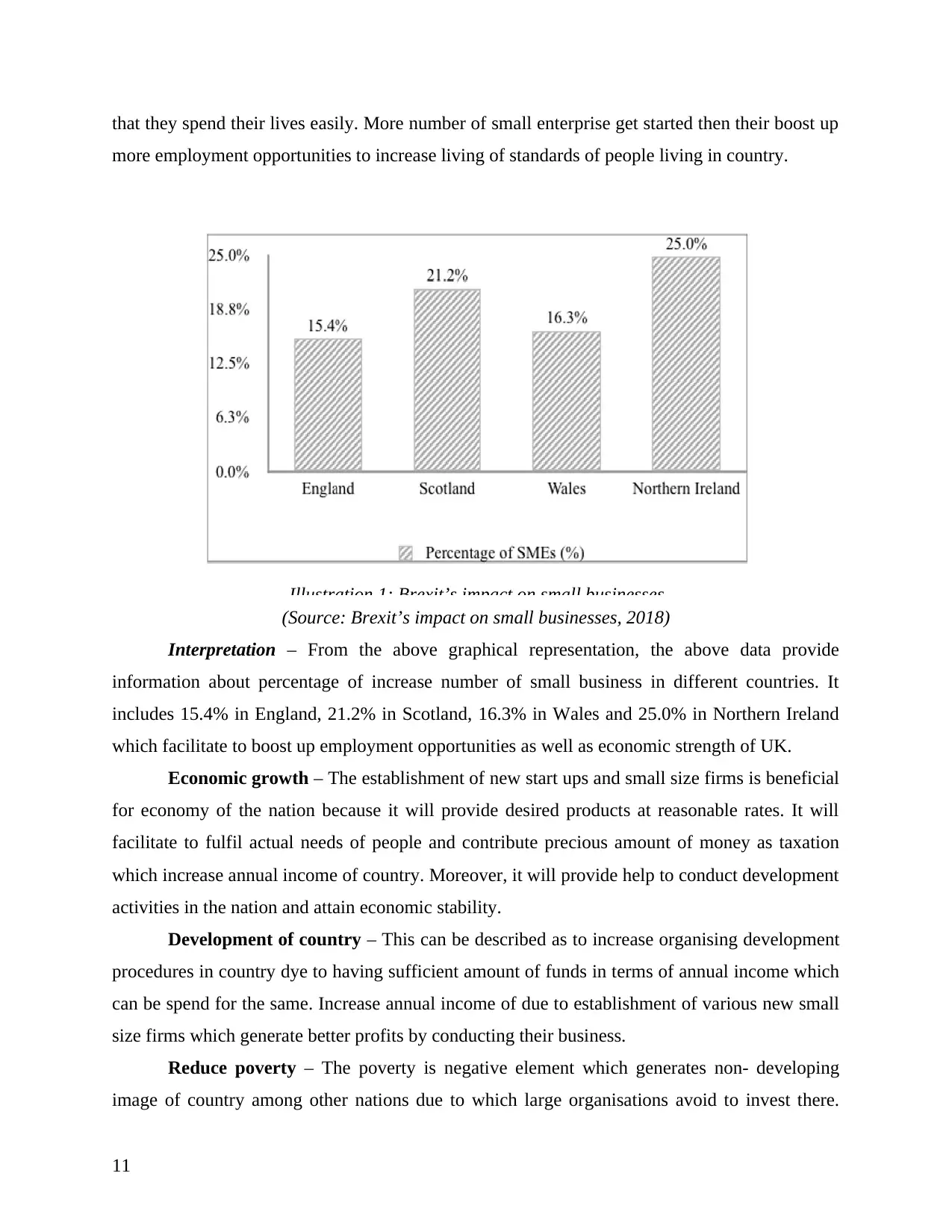
that they spend their lives easily. More number of small enterprise get started then their boost up
more employment opportunities to increase living of standards of people living in country.
(Source: Brexit’s impact on small businesses, 2018)
Interpretation – From the above graphical representation, the above data provide
information about percentage of increase number of small business in different countries. It
includes 15.4% in England, 21.2% in Scotland, 16.3% in Wales and 25.0% in Northern Ireland
which facilitate to boost up employment opportunities as well as economic strength of UK.
Economic growth – The establishment of new start ups and small size firms is beneficial
for economy of the nation because it will provide desired products at reasonable rates. It will
facilitate to fulfil actual needs of people and contribute precious amount of money as taxation
which increase annual income of country. Moreover, it will provide help to conduct development
activities in the nation and attain economic stability.
Development of country – This can be described as to increase organising development
procedures in country dye to having sufficient amount of funds in terms of annual income which
can be spend for the same. Increase annual income of due to establishment of various new small
size firms which generate better profits by conducting their business.
Reduce poverty – The poverty is negative element which generates non- developing
image of country among other nations due to which large organisations avoid to invest there.
11
Illustration 1: Brexit’s impact on small businesses
more employment opportunities to increase living of standards of people living in country.
(Source: Brexit’s impact on small businesses, 2018)
Interpretation – From the above graphical representation, the above data provide
information about percentage of increase number of small business in different countries. It
includes 15.4% in England, 21.2% in Scotland, 16.3% in Wales and 25.0% in Northern Ireland
which facilitate to boost up employment opportunities as well as economic strength of UK.
Economic growth – The establishment of new start ups and small size firms is beneficial
for economy of the nation because it will provide desired products at reasonable rates. It will
facilitate to fulfil actual needs of people and contribute precious amount of money as taxation
which increase annual income of country. Moreover, it will provide help to conduct development
activities in the nation and attain economic stability.
Development of country – This can be described as to increase organising development
procedures in country dye to having sufficient amount of funds in terms of annual income which
can be spend for the same. Increase annual income of due to establishment of various new small
size firms which generate better profits by conducting their business.
Reduce poverty – The poverty is negative element which generates non- developing
image of country among other nations due to which large organisations avoid to invest there.
11
Illustration 1: Brexit’s impact on small businesses
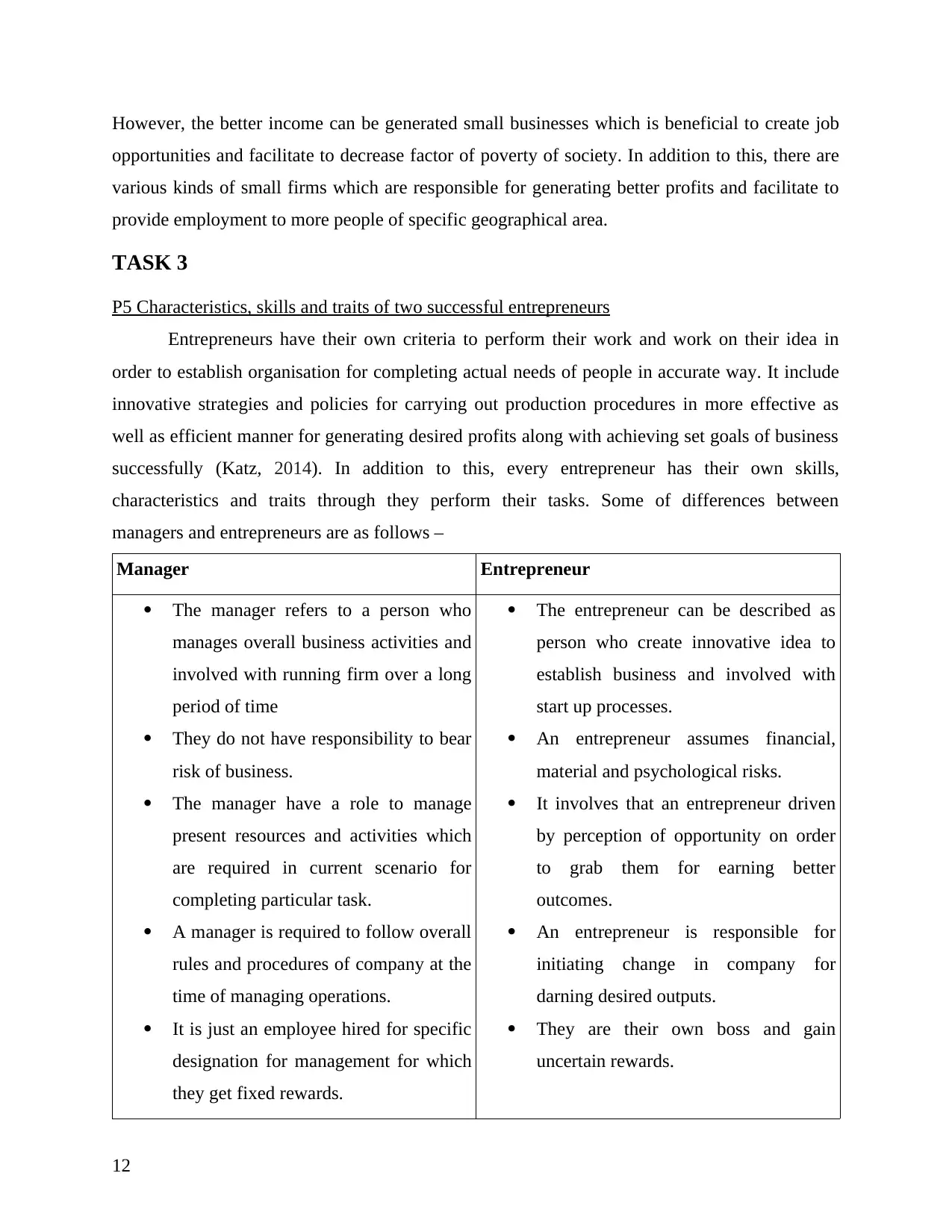
However, the better income can be generated small businesses which is beneficial to create job
opportunities and facilitate to decrease factor of poverty of society. In addition to this, there are
various kinds of small firms which are responsible for generating better profits and facilitate to
provide employment to more people of specific geographical area.
TASK 3
P5 Characteristics, skills and traits of two successful entrepreneurs
Entrepreneurs have their own criteria to perform their work and work on their idea in
order to establish organisation for completing actual needs of people in accurate way. It include
innovative strategies and policies for carrying out production procedures in more effective as
well as efficient manner for generating desired profits along with achieving set goals of business
successfully (Katz, 2014). In addition to this, every entrepreneur has their own skills,
characteristics and traits through they perform their tasks. Some of differences between
managers and entrepreneurs are as follows –
Manager Entrepreneur
The manager refers to a person who
manages overall business activities and
involved with running firm over a long
period of time
They do not have responsibility to bear
risk of business.
The manager have a role to manage
present resources and activities which
are required in current scenario for
completing particular task.
A manager is required to follow overall
rules and procedures of company at the
time of managing operations.
It is just an employee hired for specific
designation for management for which
they get fixed rewards.
The entrepreneur can be described as
person who create innovative idea to
establish business and involved with
start up processes.
An entrepreneur assumes financial,
material and psychological risks.
It involves that an entrepreneur driven
by perception of opportunity on order
to grab them for earning better
outcomes.
An entrepreneur is responsible for
initiating change in company for
darning desired outputs.
They are their own boss and gain
uncertain rewards.
12
opportunities and facilitate to decrease factor of poverty of society. In addition to this, there are
various kinds of small firms which are responsible for generating better profits and facilitate to
provide employment to more people of specific geographical area.
TASK 3
P5 Characteristics, skills and traits of two successful entrepreneurs
Entrepreneurs have their own criteria to perform their work and work on their idea in
order to establish organisation for completing actual needs of people in accurate way. It include
innovative strategies and policies for carrying out production procedures in more effective as
well as efficient manner for generating desired profits along with achieving set goals of business
successfully (Katz, 2014). In addition to this, every entrepreneur has their own skills,
characteristics and traits through they perform their tasks. Some of differences between
managers and entrepreneurs are as follows –
Manager Entrepreneur
The manager refers to a person who
manages overall business activities and
involved with running firm over a long
period of time
They do not have responsibility to bear
risk of business.
The manager have a role to manage
present resources and activities which
are required in current scenario for
completing particular task.
A manager is required to follow overall
rules and procedures of company at the
time of managing operations.
It is just an employee hired for specific
designation for management for which
they get fixed rewards.
The entrepreneur can be described as
person who create innovative idea to
establish business and involved with
start up processes.
An entrepreneur assumes financial,
material and psychological risks.
It involves that an entrepreneur driven
by perception of opportunity on order
to grab them for earning better
outcomes.
An entrepreneur is responsible for
initiating change in company for
darning desired outputs.
They are their own boss and gain
uncertain rewards.
12
⊘ This is a preview!⊘
Do you want full access?
Subscribe today to unlock all pages.

Trusted by 1+ million students worldwide
1 out of 17
Related Documents
Your All-in-One AI-Powered Toolkit for Academic Success.
+13062052269
info@desklib.com
Available 24*7 on WhatsApp / Email
![[object Object]](/_next/static/media/star-bottom.7253800d.svg)
Unlock your academic potential
Copyright © 2020–2026 A2Z Services. All Rights Reserved. Developed and managed by ZUCOL.





